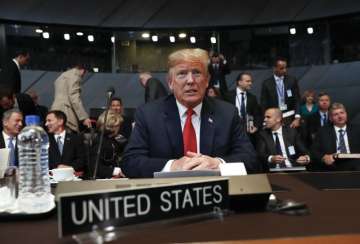US President Donald Trump has reiterated that the USD 1.3 billion aid to Pakistan will remain suspended till the country does not act against militant safe havens inside its territory.
"I want Pakistan to help us. We're no longer paying USD 1.3 billion to Pakistan. We're paying them nothing because that's what they've done to help us. Nothing," Trump told reporters at the White House on Tuesday before leaving for his private Mar-a-Lago resort in Florida for the Thanksgiving holidays.
Over the last few days, Trump has accused Pakistan of not helping it in its fight against terrorism.
In an interview to Fox News over the weekend, Trump said that people in Pakistan knew that Osama bin Laden, Al Qaeda leader, was living in a mansion near their garrison city of Abbottabad, but they did not tell the US and kept on accepting billions of dollars in aid.
"And I cut those payments off a long time ago. We're not paying Pakistan any money because they're not helping us at all and we'll see where it all goes," Trump said.
Early this year, Trump had announced to stop all security assistance to Pakistan.
"I hope to have a good relationship with Pakistan," said Trump indicating that the relationship between the two countries can come back on track, if Pakistan takes action against terrorist groups and their safe havens.
"But right now, we're paying Pakistan nothing. I cut them off. They were getting USD1.3 billion a year. They're not getting anything now," Trump asserted.
However, former Pakistani Ambassador to the US, Husain Haqqani, said Trump might be incorrect in saying that Pakistan has not done anything for the US.
Over the decades, Pakistan has helped the United States with some of its policy objectives, he said.
"He is right in noting that Pakistan has offered tactical cooperation in return for aid while at the same time undermined strategic US objectives,” Haqqani told PTI.
Pakistani leaders, he said are being disingenuous in describing the US as "ungrateful".
Americans have provided over USD 43 billion in military and economic assistance since 1954, helped build Pakistan's conventional military capability, and bailed Pakistan out of both economic and political crises on several occasions, he said.
Haqqani, who is the director for South and Central Asia at the prestigious Hudson Institute think-tank in Washington DC, said Islamabad would continue to be tempted to go back to old transactional patterns, but not Washington.
"It is the Americans who are likely to be less interested in returning to what I describe in my book on the subject as 'Magnificent Delusions.' Not only do Pakistan's ambitions in Afghanistan conflict with US plans but the two countries strongly disagree about China’s expanding influence in Asia," Haqqani told PTI.
Observing that only a strategic rethink on the part of Pakistan can lead to a reset in US-Pakistan ties, Haqqani said until then, occasional twitter spats and "we paid a heavy price for being your ally" statements will continue to characterise the unusual relationship.
Latest World News
